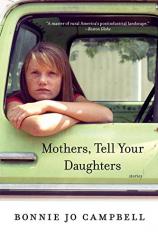Mothers, Tell Your Daughters: Stories
Review
Mothers, Tell Your Daughters: Stories
“I lived the life the way I could,” declares the elderly narrator of the title story in Bonnie Jo Campbell’s latest collection. She’s bedridden and voiceless following a stroke, but her mind is very much active as she reflects, unapologetically, on the choices she’s made. Those are the choices her daughter, who’s fled her mother’s Michigan farm for a career in academia, can’t forgive. “[Y]ou would’ve failed your own daughter if you had one,” the narrator muses. “That’s women’s studies.”
The hard-luck lives of the rural and working poor who populate the 16 stories in MOTHERS, TELL YOUR DAUGHTERS are rarely pretty. Often, the evidence of their troubles is written across their broken bodies. In “Multitude of Sins,” a cruel husband is rendered impotent by a tumor “the size and shape of a beef tongue,” while the narrator of “Blood Work, 1999” sacrifices her life for the less fortunate after her high school boyfriend is diagnosed with testicular cancer. In “To You, as a Woman,” a young mother’s toothache brings devastating consequences. “I can no longer trust this strong body of mine,” says the pregnant narrator of “Natural Disasters” as she worries about how she will protect her unborn child from the world’s many dangers.
"In the hands of a less capable writer, the gritty realism of these stories might turn them into bleak poverty porn... But Campbell...treats her characters with a quiet respect that they rarely receive in life."
The women in Campbell’s stories find that their bodies are a liability in other ways as well. The teen girl in “Sleepover,” which opens the collection, is just learning to wield her sexual power, even as she discovers that men may never see her as more than an assemblage of body parts. Rape and sexual abuse are depressingly common, with victims who seem resigned to silence. “Telling won’t make it better, and it will open up a whole can of worms,” concludes the narrator of “Playhouse.” Being let down, especially by the husbands and lovers they can’t help but let into their lives and their hearts, is something these women have come to expect.
But for all their struggles, Campbell’s damaged heroines aren’t doormats. These women are strong and smart, but they are often hemmed in by circumstance and trapped in domestic disasters not entirely of their own making. Most have learned to temper their emotions and curtail their hopes in order to protect themselves from a world that seems intent on beating them down. A little naked emotion can leave you dangerously exposed, as Sherry, the single mom of “Somewhere Warm,” one of the collection’s standout stories, discovers. She wants nothing more than a home filled with love “like a comforter in which they could all stay wrapped, warm and cozy, whatever storms raged outside,” but her efforts to create that safe space for her family backfire badly.
In the hands of a less capable writer, the gritty realism of these stories might turn them into bleak poverty porn --- a grim traipse through the lives of those unlucky enough to be born on the bottom rungs of the economic ladder. But Campbell, who has covered similar territory in her previous collection, AMERICAN SALVAGE, as well as her novels, treats her characters with a quiet respect that they rarely receive in life.
Not every piece matches the quiet power of “Mothers, Tell Your Daughters” and “Somewhere Warm.” A few exceptionally short stories in particular seem like padding for an already slim collection. But the instances where Campbell stretches her literary muscles beyond her familiar rural Michigan setting, including stories set on a circus train and in communist Romania, more than make up for those small missteps. Wherever she trains her eye, she finds people confronting a world where disaster seems to lurk around every corner. Yet even in the face of unrelenting harshness, Campbell’s characters sometimes find room for hope. In “The Fruit of the Paw Paw Tree,” the book’s final story, the narrator looks toward the future with something like optimism: “There was no law, though, that said she couldn’t give a man a chance.”
Reviewed by Megan Elliott on October 9, 2015
Mothers, Tell Your Daughters: Stories
- Publication Date: October 4, 2016
- Genres: Fiction, Short Stories
- Paperback: 272 pages
- Publisher: W. W. Norton & Company
- ISBN-10: 0393353265
- ISBN-13: 9780393353266





